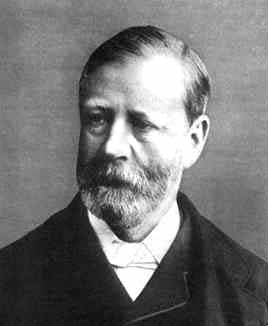
Henry William Watson
 المؤلف:
A D D Craik
المؤلف:
A D D Craik
 المصدر:
Mr Hopkins, Men: Cambridge Reform and British Mathematics in the 19th Century
المصدر:
Mr Hopkins, Men: Cambridge Reform and British Mathematics in the 19th Century
 الجزء والصفحة:
...
الجزء والصفحة:
...
 13-11-2016
13-11-2016
 1323
1323
Born: 25 February 1827 in Marylebone, London, England
Died: 11 January 1903 in Berkswell (near Coventry), England

Henry Watson's mother was Eleanor Mary Kingston, and his father was Thomas Watson who served in the Royal Navy. Henry was educated at King's College, London, winning the first mathematical scholarship which had been set up there, then in 1846 he went to Trinity College, Cambridge, again with a scholarship. He graduated in 1850 as second wrangler and Smith's prizeman.
In 1851 Watson became a fellow of Trinity College and from 1851 until 1853 he was a tutor in mathematics at Cambridge. In 1854, after he had spent a short time studying law in London, he became a mathematics master at the City of London School. While holding this position, Watson married Emily Rowe from Cambridge in 1856. They had three children, one son and two daughters. From 1857 Watson lectured at King's College, London. In 1860-61 Cambridge appointed him moderator and examiner for the Mathematical Tripos.
In fact Watson has been ordained a deacon in 1856 and he took priest's orders two years later. From 1857 until 1865 he was mathematics master at Harrow School. He left in 1865, however, to become Rector of Berkswell with Barston near Coventry where he remained until he retired [3]:-
This afforded him ample leisure to pursue his mathematical and scientific studies ...
After leaving Berkswell, Watson went to live in Brighton.
Watson wrote a number of mathematics books during the time he was rector of Berkswell. He wrote The elements of plane and solid geometry (1871), Treatise on the kinetic theory of gases (1876). After this book appeared Watson corresponded with Maxwell and the results of this correspondence is contained in the second edition of the book which appeared in 1893.
After publishing on dynamics in 1879, Watson wrote a two volume work The mathematical theory of electricity and magnetism. The first volume Electrostatics appeared in 1885, the second Magnetism and electrodynamics appeared in 1889.
In addition to these books he wrote on Lagrange's method and Monge's method for solving partial differential equations and, jointly with Galton, he wrote On the probability of extinction of families. This paper was written after a correspondence between the authors in 1873 and the paper contains a version of the 'Criticality Theorem' which is the foundation of the modern theory of branching processes. Kendall describes in [5] how the work started:-
Galton ... gave to the problem [of extinction of families] a precise mathematical formulation, and communicated it in 1873 to ... the Educational Times. ... The only solution received did not please Galton ... He therefore persuaded Watson to take up the matter. ... Galton had consulted Watson a year or so earlier about a device for obtaining useful work from the energy of waves...
Watson was elected a fellow of the Royal Society in 1881 and given an honorary D.Sc. by Cambridge in 1883. He was nominated by the Senate of Cambridge University to represent it as a governor on the King Edward's Foundation in Birmingham. He was bailiff of King Edward's School for three years.
Among his interests was mountaineering and he was an early member of the Alpine Club. He was also a founder member of the Birmingham Philosophical Society and served as its president in 1880-81.
Books:
- A D D Craik, Mr Hopkins, Men: Cambridge Reform and British Mathematics in the 19th Century (Cambridge 2007)
Articles:
- Henry Watson, Nature 22 Jan 1903.
- Obituary in The Times
- Henry William Watson, Dictionary of National Biography, Second Supplement Vol III (London, 1913), 605.
- D G Kendall, Branching processes since 1873, J. London Math. Soc. 41 (1966), 385-406.
- D G Kendall, Branching processes since 1873, in M G Kendall and R L Plackett (eds.), Studies in the History of Statistics and Probability II (London, 1977), 383-405.
 الاكثر قراءة في 1820to1829
الاكثر قراءة في 1820to1829
 اخر الاخبار
اخر الاخبار
اخبار العتبة العباسية المقدسة


